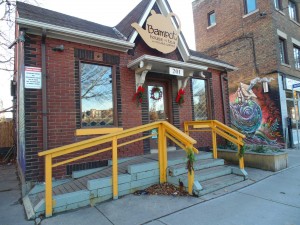Proposed hookah lounge category voted down

Bampot Bohemian House of Tea & Board Games on Harbord Street will remove shisha from its menu after a city-wide ban takes effect in April 2016. Corrina King, Gleaner News
By Dilara Kurtaran
Local shisha bar owners are scrambling to change their business model after city councillors voted 34 to three to ban shisha from Toronto’s lounges and restaurants starting in April 2016.
Toronto is the latest city to ban shisha. Peterborough, Brantford, and Barrie are three of the few cities that have already banned the public use of shisha, while Alberta, New Brunswick, Prince Edward Island, Quebec, and Nova Scotia have already banned hookah use in public.
A hookah is a tobacco water pipe with a bowl and a long hose that is used to smoke a tobacco and molasses mixture. Shisha is the flavoured molasses mixture minus the tobacco.
“They are destroying a culture basically,” said Andrew Lopes, who owns Bloor Street West’s Sheesha Lounge, which has been open since July 2009. “It is unhealthy, no doubt about it…nothing is good about smoking, but drinking is bad for you too, and so is smoking marijuana, which they are going to legalize.”
Lopes, who said he invested $250,000 in building his lounge, has already begun remodelling it into an all-you-can-taste Italian experience.
Transforming the Sheesha Lounge into the Chicago Don — an all-you-can-eat tapas restaurant — will cost an additional $50,000.
“They are taking away our life, I have kids and my mom comes here every day to make the food,” said Lopes. “If [the new restaurant] doesn’t work, we are going to have to sell our cars and our houses.”
He added that the city should have opted to regulate the smoking of shisha rather than instituting a complete ban.
Jim Karygiannis (Ward 39, Scarborough-Agincourt) voted against the ban, and proposed a hookah lounge category that would allow licensees to serve non-tobacco shisha and limit other offerings to coffee, juice, and tea (so, no food or liquor). Owners would be required to pay a special business fee to operate such establishments, which would be open only to those over the age of 19, and feature signs outlining the harmful effects of shisha smoking.
However, the majority of councillors still voted for the shisha ban, refusing to regulate hookah smoking instead.
“Public health has been monitoring this issue for the past few years,” explained Julie Amoroso, a policy specialist for Toronto Public Health. “Over the past few years the evidence has been increasing of the health effects.”
She said that Toronto Public Health has determined that prohibiting hookah use at licensed establishments in Toronto is the most effective way to address related health concerns.
Smoking lighted tobacco (including the use of water pipes) in enclosed public places has been prohibited by the Smoke Free Ontario Act since 2006, according to a Health Risks of Indoor Water Pipe Smoking report from 2014 by the Medical Officer of Health.
Herbal water pipe smoking exposes the smoker to similar or higher levels of some cancer-causing chemicals, including polycyclic aromatic hydrocarbons, heavy metals, as well as harmful levels of carbon monoxide and tar.
Further, the Ontario Tobacco Research Unit has determined that staff and the water pipe users in such lounges are exposed to hazardous levels of air quality.
“I’ve been smoking shisha for 15 years, and if I want to do it I can still do it from home,” said Mark Newell, who owns Harbord Street’s Bampot House of Tea & Board Games.
Thanks to the new ban, his café won’t be offering shisha to its customers anymore.
“It’s an attack on personal freedom, not cultural freedom,” said Newell, adding that society “bubble wraps” everything and people should have the right to make their own choice.
